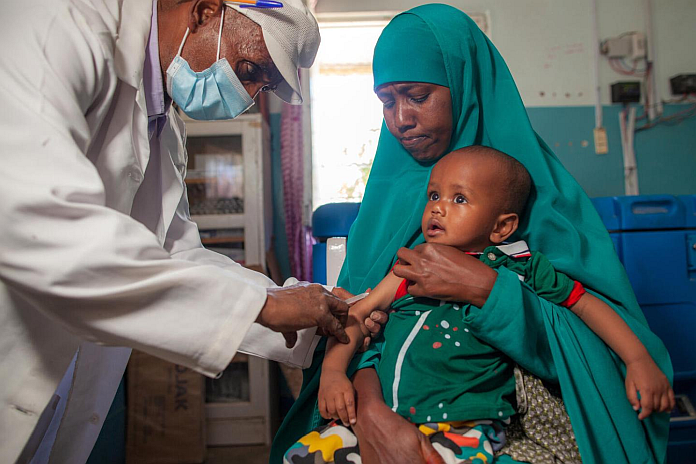NEW YORK / GENEVA – An increase in measles cases in January and February 2022 is a worrying sign of a heightened risk for the spread of vaccine-preventable diseases and could trigger larger outbreaks, particularly of measles affecting millions of children in 2022, warn WHO and UNICEF.
Pandemic-related disruptions, increasing inequalities in access to vaccines, and the diversion of resources from routine immunization are leaving too many children without protection against measles and other vaccine-preventable diseases.
The risk for large outbreaks has increased as communities relax social distancing practices and other preventive measures for COVID-19 implemented during the height of the pandemic. In addition, with millions of people being displaced due to conflicts and crises including in Ukraine, Ethiopia, Somalia and Afghanistan, disruptions in routine immunization and COVID-19 vaccination services, lack of clean water and sanitation, and overcrowding increase the risk of vaccine-preventable disease outbreaks.
Almost 17,338 measles cases were reported worldwide in January and February 2022, compared to 9,665 during the first two months of 2021. As measles is very contagious, cases tend to show up quickly when vaccination levels decline. The agencies are concerned that outbreaks of measles could also forewarn outbreaks of other diseases that do not spread as rapidly.
Apart from its direct effect on the body, which can be lethal, the measles virus also weakens the immune system and makes a child more vulnerable to other infectious diseases like pneumonia and diarrhoea, including for months after the measles infection itself among those who survive. Most cases occur in settings that have faced social and economic hardships due to COVID-19, conflict, or other crises, and have chronically weak health system infrastructure and insecurity.
“Measles is more than a dangerous and potentially deadly disease. It is also an early indication that there are gaps in our global immunization coverage, gaps vulnerable children cannot afford,” said Catherine Russell, UNICEF executive director. “It is encouraging that people in many communities are beginning to feel protected enough from COVID-19 to return to more social activities. But doing so in places where children are not receiving routine vaccination creates the perfect storm for the spread of a disease like measles.”
In 2020, 23 million children missed out on basic childhood vaccines through routine health services, the highest number since 2009 and 3.7 million more than in 2019.
| Top 5 countries with reported measles cases in the last 12 months, until April 2022 1 | ||||
| Country | Reported Measles cases | Rate per million cases | First dose measles coverage (%), 20192 | First dose measles coverage (%), 20203 |
| Somalia | 9,068 | 554 | 46 | 46 |
| Yemen | 3,629 | 119 | 67 | 68 |
| Afghanistan | 3,628 | 91 | 64 | 66 |
| Nigeria | 12341 | 58 | 54 | 54 |
| Ethiopia | 3039 | 26 | 60 | 58 |
As of April 2022, the agencies report 21 large and disruptive measles outbreaks around the world in the last 12 months. Most of the measles cases were reported in Africa and the East Mediterranean region. The figures are likely higher as the pandemic has disrupted surveillance systems globally, with potential underreporting.
Countries with the largest measles outbreaks since the past year include Somalia, Yemen, Nigeria, Afghanistan, and Ethiopia. Insufficient measles vaccine coverage is the major reason for outbreaks, wherever they occur.
“The COVID-19 pandemic has interrupted immunization services, health systems have been overwhelmed, and we are now seeing a resurgence of deadly diseases including measles. For many other diseases, the impact of these disruptions to immunization services will be felt for decades to come,” said Dr Tedros Adhanom Ghebreyesus, director-general of the World Health Organization. “Now is the moment to get essential immunization back on track and launch catch-up campaigns so that everybody can have access to these life-saving vaccines.”
As of 1 April 2022, 57 vaccine-preventable disease campaigns in 43 countries that were scheduled to take place since the start of the pandemic are still postponed, impacting 203 million people, most of whom are children. Of these, 19 are measles campaigns, which put 73 million children at risk of measles due to missed vaccinations. In Ukraine, the measles catch-up campaign of 2019 was interrupted due to the COVID-19 pandemic and thereafter due to the war. Routine and catch-up campaigns are needed wherever access is possible to help make sure there are not repeated outbreaks as in 2017- 2019, when there were over 115,000 cases of measles and 41 deaths in the country – this was the highest incidence in Europe.
Coverage at or above 95 percent with two doses of the safe and effective measles vaccine can protect children against measles. However, COVID-19 pandemic related disruptions have delayed the introduction of the second dose of the measles vaccine in many countries.
As countries work to respond to outbreaks of measles and other vaccine-preventable diseases, and recover lost ground, UNICEF and WHO, along with partners such as Gavi, the Vaccine Alliance, the partners of the Measles & Rubella Initiative (M&RI), Bill & Melinda Gates Foundation, and others are supporting efforts to strengthen immunization systems by:
- Restoring services and vaccination campaigns so countries can safely deliver routine immunization programmes to fill the gaps left by the backsliding;
- Helping health workers and community leaders communicate actively with caregivers to explain the importance of vaccinations;
- Rectifying gaps in immunization coverage, including identifying communities and people who have been missed during the pandemic;
- Ensuring that COVID-19 vaccine delivery is independently financed and well-integrated into overall planning for immunization services so that it is not carried out at the cost of childhood and other vaccination services;
- Implementing country plans to prevent and respond to outbreaks of vaccine-preventable diseases and strengthening immunization systems as part of COVID-19 recovery efforts.





